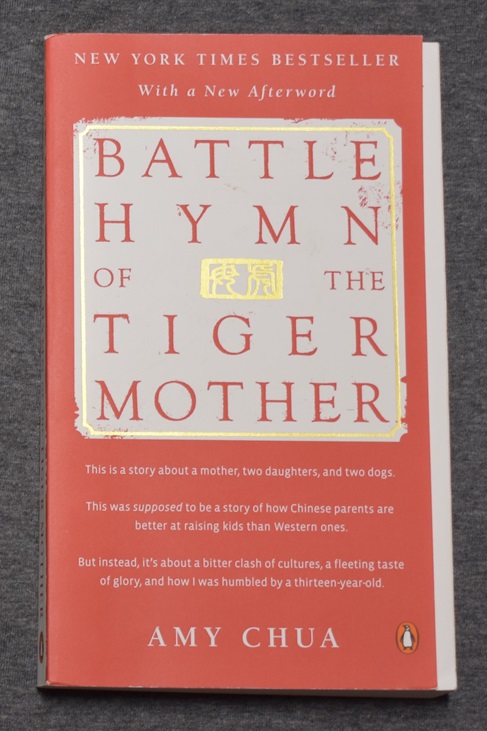Battle Hymn of the Tiger Mother by Amy Chua.
Penguin, New York, 2011.
Adult nonfiction, 244 pages.
Not leveled.
The story of a mother who tries to apply strict Chinese parenting techniques to her American daughters and finds that she’s making all of them miserable.

Just as I’m working on my goal of trying to write negative and neutral reviews (and thus be able to pass along those books and clear shelves), I was given books by a few different acquaintances. This was exciting as new-to-me books always are, and it was frustrating because there were far more books incoming than outgoing on these review shelves! So I did a push to read and review several in order to keep things moving. Among them were some Amy Chua books, and this was the earliest published so I gave it a try.
Before writing a review of this book, it would probably behoove me to mention that Chua and her family are not without controversy. Much of the notoriety has little to do with this book, but some of it is specific to this book. Chua had a piece in the Wall Street Journal entitled “Why Chinese Mothers are Superior” which drew huge amounts of controversy and debate a decade ago.
That piece was mainly an excerpt from this book, and it’s hard to believe that it created so much fervor. I honestly had forgotten about this other than vaguely remembering that I’d no interest in reading this when it came out. It seems that many who lambasted Chua based on the article did not read the book at all, because the stories she shares read very differently in context. Of course, that’s always the danger of a heavily satirical piece, it could be read as straight opinion. I think that’s part of what went wrong here, that many people were reading her list of restrictions as a recommendation for other parents – but within the book, they read much more comically as an example of Chua’s melodramatic over the top parenting.
She repeatedly refers to elements of her parenting style as specifically Chinese, and I think that’s because she’s mainly familiar with three cultures – her own, her husband’s, and the generic “white” culture that permeates America. While no group is a monolith, many Latine or Fillipina children aren’t allowed to go on sleepovers or attend birthday parties (except with relatives) and I know religious families and families of children with severe allergies with similar restrictions. I’ve known Igbo and Vietnamese families who had the same heavy emphasis on grades and did not allow extracurricular sports.
Sometimes three main parenting styles are described. Authoritarian parents require unquestioning obedience and take no input from the child. Permissive parents allow children to do whatever they want, even things detrimental to their health or safety. In contrast, authoritative parents hope to gain their child’s respect and consider the child’s opinion in decision-making. They value the child’s insights and cooperation, but are the final authority in all parental decisions.
Chua’s initial parenting style was extremely authoritarian and, as she comes to recognize herself, deeply flawed. I think she was aiming for authoritative but doesn’t quite get there. However, it was still an interesting read as typically the only nonfiction books about authoritarian parenting are religious. Since her husband is Jewish and their children are raised in that religion, Judaism is mentioned a few times in passing in the book, but the focus is always on Chinese parenting values and ideas.
She complains frequently about the difficulty of incorporating Chinese parenting styles and techniques in America, but I think Chua largely overlooks the role of the community and extended family in her narrative here. She’s fairly close with her own family but doesn’t live near them. Her children are around other Asians but seem to live and attend school in a mostly white environment and Chua, working at Yale, is also steeped in a white, Western setting.
While Chua is angry (at times rightfully so, at others unfairly outraged) about her mother-in-law’s excessively permissive parenting and grandparenting, she initially has trouble accepting even her own Chinese mother’s reminders that she’s pushing her daughter too hard. Lately there is more awareness of the downside of high-stress, achievement driven, authoritarian parenting – enough that the Chinese government has even made changes to official policies.
As a parenting manifesto, this is undoubtedly a failure. But I don’t think it was meant to be read as a self-help, parenting book. As a memoir, this is surprisingly engrossing and certainly thought-provoking. I didn’t always like Chua, but I was compelled to find out what happened next. Taken as whole the book is very pro-Western parenting. From the hints and foreshadowing at the beginning to the glorious comeuppance at the end, Chua has ultimately written in support of American individualism.
I don’t know if I can fully recommend this given how many people have taken it very seriously and ignored the sarcasm and self-criticism. If you are looking for a self-help or parenting ideas book, then please choose another. But if you can simply read this as a memoir of a mother parenting her two daughters, then I think it’s an interesting perspective on a worldview (secular purposefully authoritarian parenting) not often discussed in the USA today.